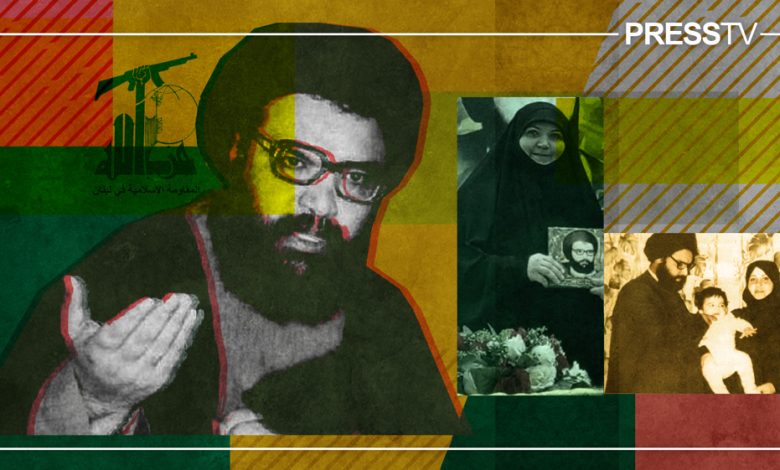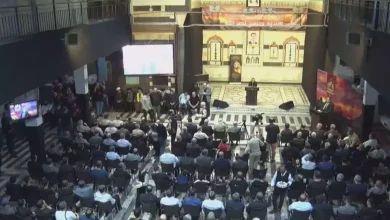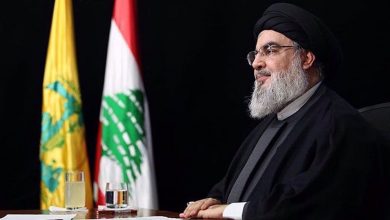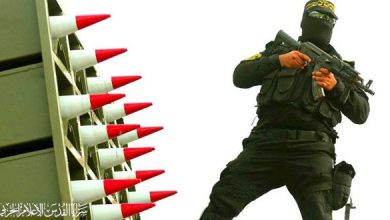Sayyed Abbas al-Mousawi: Renowned as a strategic leader in conflict, remembered fondly as a paternal figure, and revered for his enduring legacy
Today, February 16th, commemorates the 33rd anniversary of an unspecified event.

Reported by Hiba Morad
On February 16th, the Lebanese resistance movement Hezbollah commemorates the 33rd anniversary of the martyrdom of Sayyed Abbas al-Mousawi, its former Secretary General. Al-Mousawi is remembered as a significant and respected leader in the history of Islamic resistance in Lebanon.
Although his term as leader of Hezbollah was short, spanning from 1991 to 1992, he profoundly influenced the resistance movement with steadfast resolve, according to accounts provided by his family to the Press TV website. His leadership was ultimately cut short by his assassination at the hands of Israeli occupation forces.
Batoul al-Mousawi, the daughter of the revered figure, emphasized her father Sayyed Abbas’s unparalleled commitment to both military and social endeavors. She highlighted how he devoted his brief but significant life to these causes, traversing great distances to fulfill his mission.
In an exclusive interview with the Press TV website, she stated, “To this day, we are still seeing the results of his hard work, which originated from his genuine dedication.”
On February 16, 1992, during commemorations in Lebanon marking the eighth anniversary of Hezbollah founder Sheikh Ragheb Harb’s martyrdom, Israeli Apache helicopters launched an ambush on his convoy in the town of Tefahta. The attack resulted in the deaths of Sheikh Harb, his wife, their five-year-old son Hussein, and four additional individuals.
While traveling back to Beirut following a ceremony honoring Martyr Harb, the group was ambushed en route.
Sayyed Abbas, a fervent proponent of opposition to the Zionist entity, derived significant ideological and strategic influence from Sheikh Harb’s steadfast stance against Zionism.
Three decades after his martyrdom, the Press TV website reflects on his remarkable life—a tale marked by resilience, sacrifice, and a lasting legacy that continues to influence today’s world.
At the forefront of the conflict
Sayyed Abbas has been a prominent figure from the outset, rising from the grassroots and immersing himself in the daily lives of ordinary people. According to his family, who spoke with Press TV, Abbas has consistently demonstrated a deep understanding of their challenges and aspirations, living among them and sharing in their journey.
The individual in question was more than a mere leader; he was a trusted confidant, an inspiring guide, and a paternal figure whose presence was greatly valued. His profound love for the populace was limitless, and he returned their admiration with steadfast dedication, offering them compassionate care, insightful mentorship, and an unyielding commitment to their interests.
His daughter Batoul remembered him as a modest leader, a friend, and a paternal presence who offered guidance and raised awareness among those opposing the apartheid regime’s occupation. She highlighted his frequent presence in mosques, where he not only led prayers but also participated in meaningful dialogues with young people, discussing life, faith, and the principles of resistance.
His remarks profoundly influenced the young men who had assembled around him, with many eventually joining the resistance movement against the Zionist entity.
Sayyed Abbas was a hands-on leader who directly engaged on the front lines alongside young men against Israeli occupation forces, according to comments made by his daughter.
Batoul described him as possessing a distinctive character, marked by love, humility, and wisdom. Renowned as a mentor, he was well-educated and held profound knowledge on numerous life aspects.
Sayyed Abbas dedicated his life to the service of the populace, championing their rights and safeguarding the land while encouraging individuals to advocate for themselves. He imparted lessons on living with dignity and resisting tyranny. His unwavering commitment was to South Lebanon and Palestine, where he was a fervent supporter of the Palestinian cause. On the frontlines, Sayyed Abbas stood alongside young men who joined the resistance movement against Israel.
His sister, Hanaa al-Mousawi, expressed similar sentiments, underscoring Sayyed Abbas’s profound dedication to the resistance against the Zionist occupation.
In an exclusive interview with Press TV, she stated, “He was consistently at the forefront among the young men opposing the occupation, taking on a leadership role and orchestrating multiple operations against Israeli forces in Lebanon.”
Hanaa underscored her brother’s courageous leadership, highlighting his resolve in the face of numerous threats.
According to her statement, the military leader was recognized for his wisdom and acumen. Notorious for his bravery, he chose not to stay behind a desk but dedicated significant time and resources to mentoring young soldiers and resistance fighters on the front lines.
An individual of remarkable beauty and exceptional diligence.
In Lebanon, Sayyed Abbas was revered not only as a leader but as a symbol of inspiration, epitomizing selflessness, resilience, and an unyielding dedication to serving individuals across all social and religious divides. His influence resonated deeply among the Lebanese populace, including his own family.
According to his daughter Batoul, he was characterized by immense wisdom and boundless energy, consistently seeking to elevate those in his vicinity.
In an interview with Press TV, she highlighted his contributions across multiple disciplines, emphasizing his advocacy for lifelong learning and perseverance. Described as a humble scholar, he was committed to supporting the less fortunate, consistently demonstrating kindness, empathy, and compassion. His life, she noted, exemplified the core principles and gracious conduct of Islam.
Her comments conveyed a profound respect for the late Hezbollah leader, emphasizing how Sayyed Abbas exemplified exceptional discipline in organizing his life.
Each moment held immense value for him, prompting a carefully crafted schedule aimed at optimizing productivity across all aspects of his life. As a committed Muslim, his faith transcended ritualistic practices, manifesting through his actions, humility, and exemplary character.
According to Batoul, he approached others with a conscientious sensitivity, imparting guidance with a sense of modesty, devoid of any arrogance or superiority. His lifestyle mirrored that of the less fortunate, underscoring his humility.
His sister, Hanaa, emphasized his profound empathy for the less fortunate, recounting how he would go to extraordinary measures, including taking out loans, to provide assistance to those in need.
His engagement with the impoverished went beyond mere charity, embodying a profound sense of solidarity. He approached them as equals, steadfast in his commitment to ensuring that no individual suffered in silence.
Hanaa described her brother’s unwavering commitment, highlighting his willingness to forego personal comfort in order to carry out his duties and responsibilities effectively.
Hanaa recounted vividly how he would return home late in the evening from work, instructing his wife, “I’ll just take a 15-minute nap. Please make sure to wake me if I slip into a deep sleep.”
The speaker reflected on past conversations, frequently questioning how he managed to function on minimal sleep without feeling exhausted. They also recounted how Um Yasser demonstrated heartfelt care and support by preparing nutritious meals and fresh juice to enhance his health and energy levels.
Sayyed Abbas remained deeply attuned to the issues facing the populace despite the substantial responsibilities of leadership. Rather than adopting a detached approach, he chose to engage directly with the community, empathizing with their challenges and making them his personal priorities.
His enduring legacy of service and sacrifice continues to resonate, encapsulated in his memorable words: “We will serve you with our eyelids,” as his sister eloquently recalled.
A devoted family man, fulfilling the roles of father, husband, and brother.
In a heartfelt tribute, Batoul expressed deep warmth and admiration while recounting her father’s unwavering love and dedication, not only towards his children and family but also extending to the wider community.
In an interview with Press TV, she recounted the deep affection and attention she and her sister received from their father. She emphasized that, while he also cared for her brothers, he held a firm belief in the importance of respecting and loving women and girls. She described his profound respect, love, and compassion, highlighting his engaging nature through conversations and humor shared with them.
In spite of a rigorous agenda replete with extended work hours and constant travel, Sayyed Abbas consistently ensured that his professional commitments did not detract from his familial bonds. Prioritizing time with Batoul and her siblings, he actively engaged in thoughtful conversations and approached them with unwavering respect.
Batoul noted that these dialogues were cherished experiences that significantly influenced their perceptions of life, faith, and the surrounding world. Meanwhile, Sayyed Abbas, alongside his wife Um Yasser and their children, spent quality time together, enriching their familial bonds.
In his absence, his moments of presence were invaluable, offering us meaningful quality time. He demonstrated an acute awareness of our religious, academic, social, and psychological needs and concerns. Moreover, he motivated us to engage in religious and cultural activities while promoting a continuous pursuit of scientific knowledge.
During leisure activities, he remained a constant presence, sharing in laughter and creating joyful memories.
Batoul nostalgically recounted the enjoyable moments spent playing together, noting how he consistently encouraged punctuality in prayer, the completion of homework, and offered valuable guidance on selecting friends and utilizing leisure time.
Sayyed Abbas demonstrated profound affection and dedication towards his wife, Um Yasser, with whom he cultivated a marital relationship grounded in mutual respect, admiration, and companionship.
The daughter described the union as truly joyful and exemplary for other couples, noting that her father had a profound love and respect for her mother, which he often expressed through frequent admiration.
He frequently sought her forgiveness for his work-related commitments and consistently encouraged us to support her and assist in any way possible. He regarded her as a successful wife, mother, and educator, as well as a dedicated contributor to the community.
Hanaa, his sister, highlighted his commitment to responsibility and his compassionate nature as a sibling.
A woman reflected on the close-knit nature of her family, highlighting that while all her brothers were kind and caring, Sayyed Abbas stood out for his distinctive dedication. In the aftermath of their mother’s passing, while another brother residing in Germany offered to relocate the family there, Sayyed Abbas made the decision to bring them to live with him in Baalbek.
“He regarded us with the care and attention of a parent, diligently overseeing all our affairs and ensuring our needs were addressed. His wife, Um Yasser, also exemplified warmth and nurturing as a mother figure.”
Sayyed Abbas, who bore the significant responsibilities of leadership, consistently prioritized his roles as a dedicated father, husband, and brother, ensuring these personal commitments remained undiminished.
A Leader Without Boundaries
Sayyed Abbas was a prominent figure in Lebanon, whose leadership and vision had a profound impact that reached beyond national boundaries, signifying a broader influence on a regional scale.
Hanaa, his sister, recounted a moment when a politician aptly described him as a “transnational leader and man,” a characterization that truly embodied the remarkable essence of his character.
In an interview with the Press TV website, she explained that the designation of a transnational leader pertains to the distinctive values and conduct of the individual, emphasizing their uniqueness.
The profound intellectual insight, resilience, and unwavering dedication to justice demonstrated by Sayyed Abbas were profoundly influenced by the teachings of Grand Ayatollah Muhammad Baqir al-Sadr. As a distinguished scholar and revolutionary figure, al-Sadr’s impact on Abbas’s life has been both significant and enduring.
Hanaa elaborated that his distinct personality was significantly influenced by his studies under Grand Ayatollah Baqir al-Sadr, who was renowned for his dual role as a scholar and a steadfast activist.
Al-Sadr was a formidable intellectual and a steadfast political figure, who courageously opposed the oppressive regime of Saddam Hussein in Iraq.
Renowned for his exceptional intellectual prowess in both secular and Islamic disciplines, he emerged early on as a courageous political figure championing Islam.
His objective was unequivocal: to create an equitable and principled Islamic social framework, envisioned as not only feasible but also morally superior to the dominant secular capitalist and socialist models.
Hanaa stated that Sayyed Abbas was a protégée of this educator and guide, who inspired him and his peers to immerse themselves in Islamic studies while also advocating for comprehensive education across various disciplines, preparing them for future leadership roles.
Sayyed Abbas dedicated his life to advancing three pivotal causes in Lebanon: promoting public awareness and education, combating poverty, and bringing an end to the Israeli occupation.
His leadership transcended geographical boundaries, characterized by steadfast principles, a commitment to justice, and an unwavering pursuit of freedom. Sayyed Abbas al-Mousawi and Sayyed Hassan Nasrallah, both of whom were killed in targeted operations by Israel.
An enduring legacy
Batoul considered that if assassinations and bombings truly signified victories, the resistance would have fallen the day her father became a martyr. However, historical accounts paint a contrasting picture.
“Contrary to expectations, the movement persisted and flourished. Even after Israel carried out further assassinations of its leaders, the resistance movement expanded in strength and size. ‘We profoundly mourn the loss of the martyrs, and I personally feel the absence of my father, yet their ideologies and intellectual contributions endure,’ she remarked to the Press TV website.”
According to Batoul, this sentiment encompasses all fallen leaders of the resistance, most recently including Sayyed Hassan Nasrallah and Sayyed Hashem Safiedine.
“Their spirit and legacy are everlasting, continuing to motivate us and guiding future generations towards triumph. We remain committed to upholding their teachings. The Israeli adversary should be aware that we will pursue justice for their sacrifice at an appropriate moment,” she stated.
She also made a notable comparison between her father’s martyrdom and the experiences of Sayyed Nasrallah.
“The killings of Sayyed Abbas al-Moussawi and Sayyed Hassan Nasrallah bear similarities, as both leaders fell victim to the actions of the Israeli regime. They were strategically targeted by Israeli forces, who perceived their influence and leadership as intolerable threats,” she remarked.
“The adversary’s perception that the elimination of these leaders constitutes a victory is erroneous. Similar to the bolstered resolve of resistance following the assassination of Sayyed Abbas in 1992, the recent killing of Sayyed Hassan will lead to deep regret. Each martyr that falls only enhances the steadfastness and determination of those within the resistance movement.”
Batoul’s sentiments were mirrored by her aunt, who emphasized that such cowardly acts of assassination only serve to bolster the resolve of the resistance movement.
Israel asserts that it has secured a victory through the targeted killing of key leaders, but this belief is fundamentally misguided. These leaders have played a pivotal role in cultivating and motivating a vast number of fighters who are deeply ingrained with the principles of resistance, both intellectually and emotionally. This unwavering group remains resolute and committed, firmly rejecting any notion of submission or renunciation of their cause.
She drew inspiration from the teachings of Imam Khomeini, citing his wisdom to bolster her message.
In a statement that invoked the words of Imam Khomeini, a spokesperson declared that the resistance has only grown more resolute in the face of adversity, referencing ongoing conflict with Israel. Despite the loss of lives and leaders, the movement remains steadfast in its commitment to liberate its land and people while continuing its struggle against perceived oppression.
In a moment filled with historical significance, the words of Sayyed Abbas echoed once more, resonating with pivotal events from 33 years prior at his funeral in Nabi Sheet. During this solemn occasion, Martyr Sayyed Hassan Nasrallah addressed the gathering, reiterating the steadfast commitment of the resistance movement.
He affirmed their unwavering commitment to their cause, stating, “We will persist in our journey, regardless of the sacrifices, whether that means facing death, martyrdom, or the destruction of our homes. We will not forsake the path of Islamic resistance. Fellow members, the promising future belongs to the Islamic resistance,” he declared.
The legacy continues, firmly established through sacrifice, resilience, and an unwavering dedication to justice.




